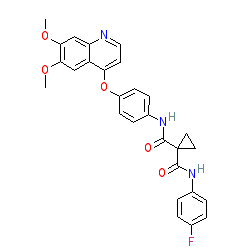GtoPdb is requesting financial support from commercial users. Please see our sustainability page for more information.
|
Synonyms: BMS907351 | Cabometyx® | Cometriq® | XL-184 | XL184
cabozantinib is an approved drug (FDA (2012), EMA (2014))
Compound class:
Synthetic organic
Comment: Cabozantinib is a Type-1, oral, small-molecule tyrosine kinase inhibitor.
Marketed formulations contain cabozantinib S-malate (PubChem CID 25102846). Ligand Activity Visualisation ChartsThese are box plot that provide a unique visualisation, summarising all the activity data for a ligand taken from ChEMBL and GtoPdb across multiple targets and species. Click on a plot to see the median, interquartile range, low and high data points. A value of zero indicates that no data are available. A separate chart is created for each target, and where possible the algorithm tries to merge ChEMBL and GtoPdb targets by matching them on name and UniProt accession, for each available species. However, please note that inconsistency in naming of targets may lead to data for the same target being reported across multiple charts. ✖
View more information in the IUPHAR Pharmacology Education Project: cabozantinib |
|
|||||||||||||||||||||||||||||||||||
| No information available. |
Summary of Clinical Use  |
| In 2009 cabozantinib was granted orphan designation by the European Commission for the treatment of medullary thyroid carcinoma. US FDA full approval was granted in 2012, for the treatment of medullary thyroid cancer that cannot be removed by surgery or that has metastasized. EU approval for this indication followed in 2014. Preliminary results from a Phase 3 trial in metastatic renal cell carcinoma that had progressed after VEGFR-targeted therapy (NCT01865747) reported a 50% improvement in progression-free survival over everolimus [2]. These clinical trial results translated to full FDA marketing authorisation for Cabometyx® branded cabozantinib in April 2016. Cabometyx® is approved for use in patients with advanced renal cell carcinoma who have already been treated with anti-angiogenic therapy, and as first-line therapy (FDA approval in December 2017 [4]) . Earlier stage clinical trials are evaluating cabozantinib against many other cancer types, and in combination or comparision with other anti-cancer therapeutics- click here to link to ClinicalTrials.gov's list of current cabozantinib trials. NCT01639508 (Phase 2) is evaluating the effectiveness of cabozantinib in advanced non-small cell lung cancers with various gene alterations, such as RET, ROS1, or NTRK fusion, or increased MET or AXL activity. In May 2018, the FDA accepted a supplemental New Drug Application (sNDA) from Exelixis for the use of cabozantinib as a treatment for patients with previously treated advanced hepatocellular carcinoma (HCC). Encouraging preliminary results from the Phase 3 CELESTIAL trial (NCT01908426) of cabozantinib in advanced HCC were published in July 2018 [1]. This sNDA led to full FDA approval in January 2019 that covers the use of cabozantinib for HCC patients who have been previously treated with sorafenib [3]. |
| Clinical Trials | |||||
| Clinical Trial ID | Title | Type | Source | Comment | References |
| NCT01639508 | Cabozantinib in Patients With RET Fusion-Positive Advanced Non-Small Cell Lung Cancer and Those With Other Genotypes: ROS1 or NTRK Fusions or Increased MET or AXL Activity | Phase 2 Interventional | Memorial Sloan Kettering Cancer Center | ||
| NCT01865747 | A Study of Cabozantinib (XL184) vs Everolimus in Subjects With Metastatic Renal Cell Carcinoma | Phase 3 Interventional | Exelixis | ||
| NCT01908426 | Study of Cabozantinib (XL184) vs Placebo in Subjects With Hepatocellular Carcinoma Who Have Received Prior Sorafenib | Phase 3 Interventional | Exelixis | ||
External links  |
|
For extended ADME data see the following: Electronic Medicines Compendium (eMC) Drugs.com European Medicines Agency (EMA) |







